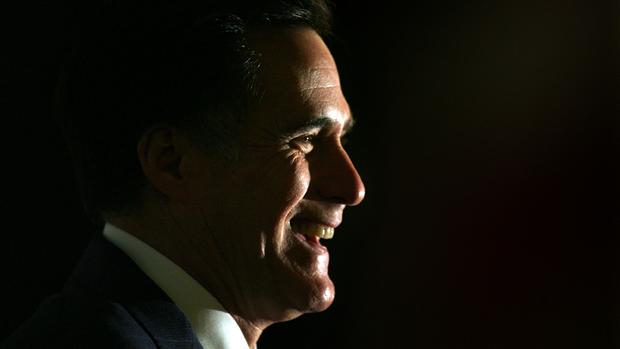Where does Mitt Romney go from here?
Updated: 10:40 p.m. ET
CHARLESTON, S.C.-- Seven days ago, it looked like Mitt Romney was going to walk away from the South Carolina Republican presidential primary with a 3-0 record: The former Massachusetts governor had a twenty-point lead in Palmetto state polls, and had recently achieved what looked like a historic one-two punch in Iowa and New Hampshire.
Tonight, following Romney's loss to Newt Gingrich in the third-in-the-nation primary, and in light of the news that Rick Santorum received 34 more votes than Romney in Iowa, the candidate's record is 1-2 instead -- and he's headed down to Florida without the sense of inevitability that had accompanied him into South Carolina.
In remarks following news of his second-place finish, Romney congratulated Gingrich explicitly before proceeding to hit him hard, even if he did not mention his rival by name in the attacks.
Romney focused on taking the fight down to Florida and beyond, and alluded to what may now become a long, hard fight for the Republican nomination. South Carolina has predicted the eventual Republican nominee in every primary contest since 1980.
Full South Carolina primary resultsSouth Carolina exit poll
GOP delegate scorecard
Complete primary and caucus results
"We're now three contests into a long primary season," Romney told his supporters. "We've still got a long way to go and a lot of work to do -- and tomorrow were gonna move onto Florida."
The candidate said he welcomed his relatively newfound competition, and said he'd be "fighting for every single vote" in "the coming weeks and months."
"I'll compete in every single state," he said.
He may well do that -- but for a candidate who just days ago seemed on the verge of walking away with the GOP nomination after just three primary contests, the news likely serves as the latest in a series of setbacks that has dogged the candidate since his arrival in the Palmetto state.
On Thursday, Iowa Republican Party officials belatedly announced that Rick Santorum, not Romney, had effectively won the state's January 3 caucuses. (They made it official on Friday.) On the same day, Texas Governor Rick Perry withdrew from the race and threw his backing to Gingrich. Later still, Romney delivered a weak debate performance, faltering when answering questions about releasing his tax returns. Meanwhile, the former speaker delivered yet another dominating performance in the CNN-sponsored debate.
"Lee Atwater used to say, 'They're for you, but are they really for you?' Nobody's really for Mitt Romney," said South Carolina Republican strategist Chip Felkel. "Romney has never generated that kind of enthusiasm, and I'm not sure he's capable of generating that kind of enthusiasm."
Going forward, Felkel said."I think it's a real question."
Full CBS News coverage: Mitt RomneyMany observers believe Romney's lackluster debate performances were a key element in deflating the sense of enthusiasm surrounding his candidacy -- particularly compared to Gingrich, who excels on the debate stage.
But even as Romney's loss tonight inevitably changes the game, it was far from decisive looking forward to future contests.
"A win by Gingrich in South Carolina does not mean Romney's out," Felkel said. "It just means we live to fight another day."
Now, he says, "They regroup. They go to Florida."
How Newt Gingrich won the South Carolina primaryWhat do South Carolina voters want?
Can Romney keep Gingrich at bay?
Unlike in South Carolina, where Romney until recently had relatively low expectations -- he did poorly in the heavily evangelical, socially-conservative state in 2008 -- the former Massachusetts governor has already poured substantial resources into Florida before the key primary contest there on January 31. His strong organizational operation will also prove essential will in a state as large as it is diverse.
The crucial question, however, is Romney's ability to maintain a hold on the perception that he is the most electable candidate to go up against President Obama in 2012.
On Tuesday, a CBS News national poll showed Romney far ahead on that question, with 56 percent of primary voters saying they perceive Romney as the most electable Republican in the race. That number appeared to be going up: earlier in the month, the figure was 49 percent; in December, it was 37. Gingrich, meanwhile, fared much worse, with just 17 percent support on the question.
According to South Carolina exit polls, Gingrich led in that category tonight. Forty-five percent of voters polled cited the ability to beat President Obama as the most important quality in a candidate; among this group, 51 percent supported Gingrich and 37 percent supported Romney. If the race comes down to who is the true conservative versus who can beat Mr. Obama, Romney could find himself facing an uphill battle very soon if those view about Gingrich spread.
Still, Gingrich has substantial challenges ahead of him in the coming primaries. The candidate lacks the kind of money and organization of the Romney campaign, and in Florida, both elements are key. (Coming off his win, however, Gingrich is likely to benefit from a huge fundraising bump.)
He has also been largely snubbed by the GOP establishment; while prominent Republicans are steadily coming out of the woodwork in favor of Romney, Gingrich has benefited far less from the support of party leadership.
Either way, Romney on Thursday enumerated the only certain consequence from Saturday night's contest: "This race is getting to be even more interesting," he said.

